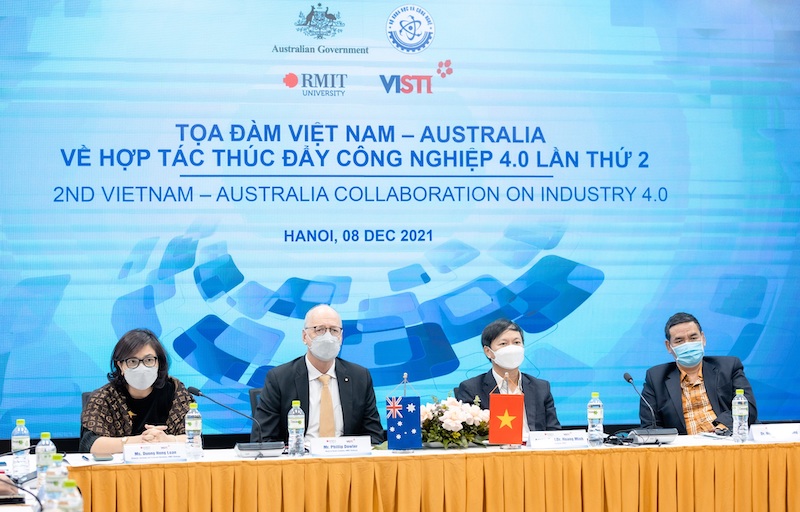Vietnam and Australia to strengthen cooperation for Industry 4.0 transformation
The event aims to seek opportunities to advance the Industry 4.0 transformation agenda in Vietnam and the Asia-Pacific region.
RMIT University and the Vietnam Institute of Science, Technology, and Innovation (VISTI) under the Ministry of Science and Technology signed a new agreement to promote the bilateral partnership for Industry 4.0 transformation in all aspects.
| Delegates at the event. Photo: RMIT |
Under the agreement, RMIT and VISTI will build programs, models, and resources to develop and improve the management capacity in science, technology, and innovation for the public and private sectors in Vietnam. Both parties will participate in policy research related to promoting science, technology, and innovation.
On the sideline of the signing ceremony, the second Australia-Vietnam Collaboration on Industrial 4.0 round-table was held on December 8 drawing the participation of delegates from Vietnam and Australia. The attendants spoke highly of Vietnam's commitment to actively engaging in embracing technology as well as developing partnerships and promoting policies framework for science, technology, and innovation.
According to the Ministry of Science and Technology, science, technology, and innovative solutions must be applicable, and this requires strong collaboration between industries and universities to work together for putting into practice research results.
Speaking at the event, Deputy Minister of Science and Technology Bui The Duy emphasized the importance of public-private partnership to promote the commercialization of research results and make research applicable. Digital transformation should be deep and wide, in which changing the people’s mindset must be the center of the process.
He said: “Industries and universities must further strengthen collaborations, and by doing so together devising Industry 4.0 solutions. We always encourage industries and universities to take advantage of government funding for research purposes.”
“We look forward to further supporting collaborative initiatives not just at governmental level, but also among academies and industries in both countries,” the deputy minister stated.
Participants at the round-table also shared experience and progress of university-industry collaborations, in addition to identifying critical factors that would accelerate Industry 4.0 in Vietnam, including new skills development and workforce transformation.
From a university’s view, Professor Aleks Subic, RMIT Deputy Vice-Chancellor (STEM College) and Vice President Digital Innovation said there will be new jobs that emerge in this post-Covid world driven by technology advancements.
“Every country needs to be ready to meet this challenge with the right capabilities and skills. The challenge is to enable new models of collaboration to drive new skills development at scale and pace,” he added.
He suggested it is only through partnerships between industry, higher education, and government that the country will be ready to take on this challenge, provide globally transformative education and high-impact research, and invest in innovation activities across sectors.
As Co-Chair of the 2nd Industry 4.0 Roundtable, Subic stated his university has continued commitments to strategic partnerships development with all stakeholders in order to support the uptake of Industry 4.0 and realization of its benefits across all sectors in Vietnam.











